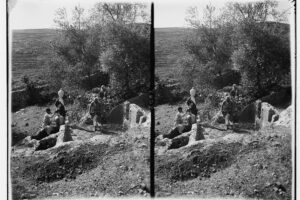I’m a Nakba survivor. In the ruins of my home, I write my hopes in stone

Palestinians gather around a winepress in Ain Karem, 1 January 1920
Leila Giries writes in +972:
I was eight years old when a Zionist militia took over the mountain top next to our village of Ain Karim and started shooting down at us. Panicked, my mother stuffed a few items into a bag, and we fled, certain that we would return home in a few weeks. The chaos was overwhelming; I remember bewildered parents desperately searching for missing children and spouses.
We were among the 750,000 Palestinians driven from our homes during the war that established the State of Israel in 1948, which Palestinians refer to as the Nakba (“catastrophe”). Though this month we commemorate 75 years since those mass expulsions, Israel’s dispossession of Palestinians has never ceased. The Nakba remains the root of the problem in Palestine-Israel, and our ongoing dispossession is the force fueling violence to this day. Both must be finally recognized and addressed in a just manner if there is ever to be a lasting peace.
Each time I return and see the ruins of our home in Ain Karim — a possibility denied to most Palestinian refugees and their descendants — the memories and trauma of what occurred in 1948 flood back. After we fled, my uncle in Baghdad sent a car to bring us to him. We arrived in Iraq after a three-day journey, only to receive the news that our house in Palestine had been bombed. Whatever hope we had of returning was dashed.
